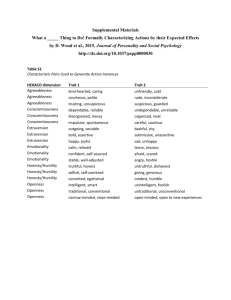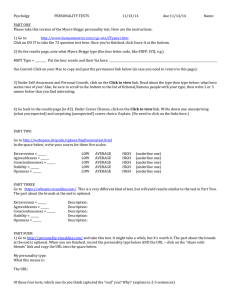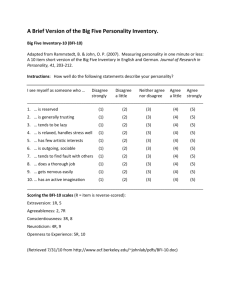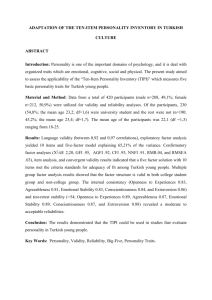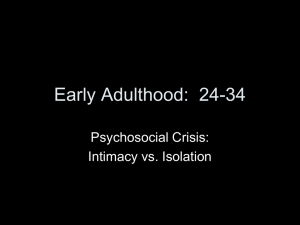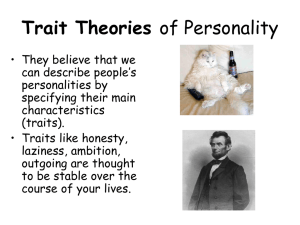Document 10465444
advertisement
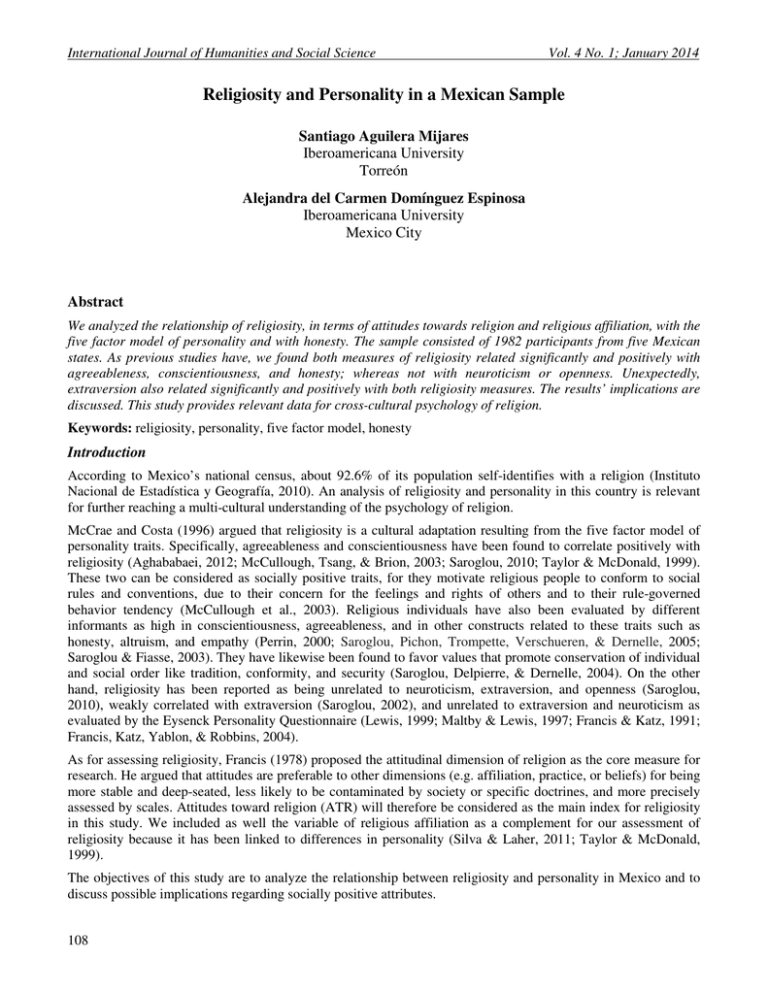
International Journal of Humanities and Social Science Vol. 4 No. 1; January 2014 Religiosity and Personality in a Mexican Sample Santiago Aguilera Mijares Iberoamericana University Torreón Alejandra del Carmen Domínguez Espinosa Iberoamericana University Mexico City Abstract We analyzed the relationship of religiosity, in terms of attitudes towards religion and religious affiliation, with the five factor model of personality and with honesty. The sample consisted of 1982 participants from five Mexican states. As previous studies have, we found both measures of religiosity related significantly and positively with agreeableness, conscientiousness, and honesty; whereas not with neuroticism or openness. Unexpectedly, extraversion also related significantly and positively with both religiosity measures. The results’ implications are discussed. This study provides relevant data for cross-cultural psychology of religion. Keywords: religiosity, personality, five factor model, honesty Introduction According to Mexico’s national census, about 92.6% of its population self-identifies with a religion (Instituto Nacional de Estadística y Geografía, 2010). An analysis of religiosity and personality in this country is relevant for further reaching a multi-cultural understanding of the psychology of religion. McCrae and Costa (1996) argued that religiosity is a cultural adaptation resulting from the five factor model of personality traits. Specifically, agreeableness and conscientiousness have been found to correlate positively with religiosity (Aghababaei, 2012; McCullough, Tsang, & Brion, 2003; Saroglou, 2010; Taylor & McDonald, 1999). These two can be considered as socially positive traits, for they motivate religious people to conform to social rules and conventions, due to their concern for the feelings and rights of others and to their rule-governed behavior tendency (McCullough et al., 2003). Religious individuals have also been evaluated by different informants as high in conscientiousness, agreeableness, and in other constructs related to these traits such as honesty, altruism, and empathy (Perrin, 2000; Saroglou, Pichon, Trompette, Verschueren, & Dernelle, 2005; Saroglou & Fiasse, 2003). They have likewise been found to favor values that promote conservation of individual and social order like tradition, conformity, and security (Saroglou, Delpierre, & Dernelle, 2004). On the other hand, religiosity has been reported as being unrelated to neuroticism, extraversion, and openness (Saroglou, 2010), weakly correlated with extraversion (Saroglou, 2002), and unrelated to extraversion and neuroticism as evaluated by the Eysenck Personality Questionnaire (Lewis, 1999; Maltby & Lewis, 1997; Francis & Katz, 1991; Francis, Katz, Yablon, & Robbins, 2004). As for assessing religiosity, Francis (1978) proposed the attitudinal dimension of religion as the core measure for research. He argued that attitudes are preferable to other dimensions (e.g. affiliation, practice, or beliefs) for being more stable and deep-seated, less likely to be contaminated by society or specific doctrines, and more precisely assessed by scales. Attitudes toward religion (ATR) will therefore be considered as the main index for religiosity in this study. We included as well the variable of religious affiliation as a complement for our assessment of religiosity because it has been linked to differences in personality (Silva & Laher, 2011; Taylor & McDonald, 1999). The objectives of this study are to analyze the relationship between religiosity and personality in Mexico and to discuss possible implications regarding socially positive attributes. 108 © Center for Promoting Ideas, USA www.ijhssnet.com In line with the reviewed literature, our hypotheses are as follows: 1) ATR will correlate positively with agreeableness, conscientiousness, and honesty, and not with neuroticism, extraversion, or openness; and 2) religiously affiliated individuals will have higher levels of ATR, agreeableness, conscientiousness, and honesty, compared to non-affiliated participants. Method Participants A convenience sample of 1,982 individuals from the general population of Mexico was used. People from five states across northern, mid, and southern Mexico participated in the study: Yucatán (22%), Distrito Federal (20%), Michoacán (20%), Guanajuato (20%), and Coahuila (19%). The ages ranged from 18 to 90 years, with an average of 29.7 years (SD = 12.15 years). Fifty-seven percent of the sample was comprised of women. As for education level, 56% reported having finished or currently studying university, 16.1% high school, 10.6% trade school, 8% postgraduate, 2.8% middle school, 3% elementary school, and 0.5% none. Furthermore, 76.2% of participants indicated being affiliated to the Catholic religion, 16% non-affiliated, 3.8% other, 2.6% Protestant, 0.8% Jewish, 0.6% Buddhist, and 0.1% Muslim. Instruments All the instruments were originally in English and were adapted to Spanish versions using the translation backtranslation method. All instruments were presented in a five point Likert scale format (1= strongly disagree to 5= strongly agree). 1. Attitudes toward Religion Scale: adapted from the Attitudes toward Catholicism, Judaism, Hinduism, and Islam scales (Francis & Enger, 2002; Francis & Katz, 2007; Francis, Santosh, Robbins, & Vij, 2008; Sahin & Francis, 2002). It consists of 19 items that evaluate beliefs toward a God (e.g. God helps me carry on a better life), religious practices or symbols (e.g. I think the religious scripts are antiquated), and religious beliefs in general (e.g. My religious beliefs truly shape the global scope of my life). 2. NEO-FFI (Costa & McCrae, 2008): an adaptation of the validated five-factor model, the NEO Personality Inventory. It measures five dimensions with twelve items for each: 1) neuroticism (e.g. I am not a person who worries much), 2) extraversion (e.g. I really like having a lot of people around me), 3) openness (e.g. I frequently try new foods or food from other countries), 4) agreeableness (e.g. I try to be friendly toward everyone I meet), and 5) conscientiousness (e.g. I keep my belongings clean and in order). 3. Honesty Scale (Nel et al., 2013): conformed by fifteen items that assess a self-evaluation of the subject’s honesty in a single dimension (e.g., I am honest in everything I do). We included honesty as an additional personality measure due to its reported link to religiosity (Perrin, 2000) and to its socially positive nature (Staats, Hupp, Hagley, 2008). Procedure The instruments were applied by research assistants in diverse locations (e.g. universities, offices, and homes) of the five Mexican states, in both individual and group sessions, and using standard instructions. All respondents participated voluntarily and anonymously. They employed fifteen minutes on average for completing the three instruments for this study, although a more extensive battery was applied at the time for the purpose of further studies. Participants were recruited by convenience and no economical compensation was given for participation. Results All instruments were tested on the Cronbach’s alpha reliability analysis. The coefficients resulted higher than .60, thus proving evidence of satisfactory internal reliability (see table 1). Exploratory factor analyses were run on all instruments and the results confirmed the previous findings regarding their dimensionality. The first hypothesis was assessed by means of the Pearson’s r correlation test, in which the personality scores were associated with ATR (see table 2). ATR had medium correlations with agreeableness, conscientiousness, and honesty; and a small correlation with extraversion. Note that honesty correlated strongly with conscientiousness, and medially to extraversion and agreeableness. For the second hypothesis, a t-test was performed to compare religiously affiliated and non-affiliated participants (see table 3). As expected, religiously affiliated individuals scored significantly higher on ATR, agreeableness, conscientiousness, and honesty. 109 International Journal of Humanities and Social Science Vol. 4 No. 1; January 2014 They also scored significantly higher in extraversion, which was not expected. Non-affiliated respondents scored significantly higher in openness. There was no significant difference in neuroticism. We additionally ran the Cohen’s d test; resulting in a large effect size in ATR and small effect sizes for the rest of the variables. Discussion We replicated previous findings, in a substantial Hispanic sample, that agreeableness, conscientiousness, and honesty tend to be salient in religious people (Aghababaei, 2012; McCullough et al., 2003; Perrin, 2000; Saroglou, 2010; Taylor & McDonald, 1999); whether indexing religiosity as attitudes towards religion or as religious affiliation. McCullough et al. (2003) proposed that agreeableness and conscientiousness motivate people to conform to social rules, whereas Staats, Hupp & Hagley (2008) stated that honesty diminishes one’s ability to neutralize or deny undesirable aspects of one’s behavior. Therefore, as did Saroglou (2010), we argue that religious people tend to present a consistent pattern of socially positive attributes. Extraversion unexpectedly related positively with both operationalizations of religiosity; in contradiction of prior studies. This trait has been nevertheless linked with greater happiness derived from more enjoyment and participation in social activities (Argyle & Lu, 1990), meaning it may be another link in religious individuals with socially positive traits. Our study’s biggest limitation is the assessment of personality only through self-reports. Acknowledgments We thank to Mirta Flores Galaz, Tonatiuh Garcia Campos, Gabriela Navarro Contreras for coordinating the data collection in the states of Yucatán, Guanajuato, and Michoacán respectively. We also thank Tania Tamahara Acosta Canales, Maria Fernanda Morales and Regina Cejudo for data collection in the Federal District, and to Fons J. R. Van de Vijver for providing us with the Honesty Scale. Declaration of Conflicting Interests We declare no potential conflicts of interest with respect to the research, authorship, and/or publication of this article. Funding This study was supported by the Iberoamericana University, Mexico City, and the National Council of Science and Technology of Mexico (CONACyT) # CB-2011-1-168978; grants awarded to the second author. References Aghababaei, N. (2012). Religious, honest and humble: Looking for the religious person with the HEXACO model of personality. Personality and Individual Differences, 53(7), 880-883. doi:10.1016/j2012.07.005 Argyle, M., & Lu, L. (1990). The happiness of extraverts. Personality and individual differences, 11(10), 10111017. Costa, P., & McCrae, R. R. (2008). Inventario de Personalidad NEO Revisado. Manual Profesional. Madrid, España: Publicaciones de Psicología Aplicada. Francis, L. J. (1978) Measurement reapplied: Research into the child’s attitude towards religion. British Journal of Religious Education 1(2), 45–51. doi:10.1080/0141620780010202 Francis, L. J., & Enger, T. (2002). The Norwegian translation of the Francis Scale of Attitude toward Christianity. Scandinavian Journal of Psychology,43(5), 363-367. doi:10.1111/1467-9450.00304 Francis, L. J., & Katz, Y. J. (1991). The relationship between personality and religiosity in an Israeli sample. Journal for the Scientific Study of Religion, 153-162. doi:10.2307/1387005 Francis, L. J., & Katz, Y. J. (2007). Measuring attitude toward Judaism: The internal consistency reliability of the Katz–Francis Scale of Attitude toward Judaism. Mental Health, Religion and Culture, 10(4), 309-324. doi:10.1080/13694670600668291 Francis, L. J., Katz, Y. J., Yablon, Y., & Robbins, M. (2004). Religiosity, personality, and happiness: A study among Israeli male undergraduates. Journal of Happiness Studies, 5(4), 315-333. doi:10.1023/B:JOHS.0000048460.35705.e8 Francis, L. J., Santosh, Y. R., Robbins, M., & Vij, S. (2008). Assessing attitude toward Hinduism: The Santosh– Francis Scale.Mental Health, Religion and Culture, 11(6), 609-621. doi:10.1080/13674670701846469 110 © Center for Promoting Ideas, USA www.ijhssnet.com Instituto Nacional de Estadística y Geografía. (2010). Censo de población y vivienda 2010 [Data file]. Retrieved from http://www.inegi.org.mx/sistemas/olap/proyectos/bd/consulta.asp?p=17118&c=27769&s=est Maltby, J., & Lewis, C. A. (1997). The reliability and validity of a short scale of attitude towards Christianity among USA, English, Republic of Ireland, and Northern Ireland adults. Personality and Individual Differences, 22(5), 649-654. McCrae, R. R., & Costa, P. T. Jr. (1996). Toward a new generation of personality theories: theoretical contexts for the five-factor model. In J. S. Wiggins (Ed.), The five-factor model of personality: Theoretical perspectives (pp. 51-87). New York: Guilford. McCullough, M. E., Tsang, J.A., & Brion, S. (2003). Personality traits in adolescence as predictors of religiousness in early adulthood: Findings from the Terman Longitudinal Study. Personality and Social Psychology Bulletin, 29(8), 980-991. doi:10.1177/0146167203253210 Nel, J. A., Valchev, V. H., Rothmann, S., Van de Vijver, F. J. R., Meiring, D., & Bruin, G. P. (2012). Journal of Personality, 80(4), 915-948. doi:10.1111/j.1467-6494.2011.00751.x Perrin, R. D. (2000). Religiosity and honesty: Continuing the search for the consequential dimension. Review of Religious Research, 41(4), 234-244. doi:10.2307/3512319 Sahin, A., & Francis, L. J. (2002). Assessing attitude toward Islam among Muslim adolescents: The psychometric properties of the Sahin-Francis scale. Muslim Education Quarterly,19(4), 35-47. doi:10.1080/15564900802035201 Saroglou, V. (2002). Religion and the five factors of personality: a meta-analytic review. Personality and Individual Differences, 32(15), 25. doi:10.1016/S0191-8869(00)00233-6 Saroglou, V. (2010). Religiousness as a cultural adaptation of basic traits: A five-factor model perspective. Personality and Social Psychology Review, 14(1), 108-125. doi:10.1177/1088868309352322 Saroglou, V., V. Delpierre, & R. Dernelle. 2004. Values and religiosity: A meta-analysis of studies using Schwartz’s model. Personality and Individual Differences, 37(4), 721–34. doi:10.1016/j.paid.2003.10.005 Saroglou, V., & Fiasse, L. (2003). Birth order, personality, and religion: A study among young adults from a three-sibling family. Personality and Individual Differences, 35(1), 19-29. doi:10.1016/S01918869(02)00137-X Saroglou, V., Pichon, I., Trompette, L., Verschueren, M., & Dernelle, R. (2005). Prosocial behavior and religion: New evidence based on projective measures and peer ratings. Journal for the Scientific Study of Religion, 44(3), 323-348. doi:10.1111/j.1468-5906.2005.00289.x Silva, A. F., & Laher, S. S. (2011). Religious orientation and personality styles in psychology students. IFE Psychologia, 19(2), 365-379. Staats, S., Hupp, J. M., & Hagley, A. M. (2008). Honesty and heroes: A positive psychology view of heroism and academic honesty. The Journal of Psychology, 142(4), 357-372. doi:10.1016/S0191-8869(00)00233-6 Taylor, A., & MacDonald, D. A. (1999). Religion and the five factor model of personality: An exploratory investigation using a Canadian university sample. Personality and Individual Differences, 27(6), 12431259. doi: 10.1016/S0191-8869(99)00068-9 111 International Journal of Humanities and Social Science Vol. 4 No. 1; January 2014 Table 1: Summary of the Descriptive Statistics Range Scales and dimensions ATR Neuroticism Extraversion Agreeableness Conscientiousness Openness Honesty n 1830 1825 1787 1887 1825 1869 1844 Note: Scales and dimensions 1. ATR 2. Neuroticism 3. Extraversion 4. Agreeableness 5. Conscientiousness 6. Openness 7. Honesty M 61.79 19.47 25.13 23.38 32.6 16.30 58.4 SD 15.36 6.88 5.26 5.16 6.99 4.50 8.61 .95 .71 .64 .65 .80 .62 .87 Potential 19-95 0-48 0-48 0-48 0-48 0-48 15-75 Real 17-85 0 -45 4-40 4-36 5-48 0-28 17-75 Skewness -0.57 0.29 -0.31 -0.34 -0.38 0.06 -0.42 Theoretical M 57 24 24 24 24 24 45 Cronbach’s alpha, ATR= Attitudes toward Religion. Table 2: Correlations between Variables 1 2 3 4 5 -.10** .25** -.37** .35** -.36** .37** .32** -.37** .38** .35** -.03 -.13** .19** .05* .16** .31** -.44** .40** .48** .58** 6 7 .20** - Note: ATR= Attitudes toward Religion. *p < .05. **p < .01. Table 3: Comparisons between Religiously Affiliated Participants and Non-Affiliated Participants Religiously Non-Affiliated Affiliated Scales and Cohen's M DE M DE t df p dimensions d ATR 64.59 12.96 45.55 15.22 -22.30 1683 .000 1.82 Neuroticism 19.41 6.81 20.08 7.11 1.48 418.67 .139 -0.10 Extraversion 25.46 5.11 23.50 5.68 -5.44 399.35 .000 0.36 Agreeableness 23.76 5.01 21.52 5.19 -6.84 421.44 .000 0.44 Conscientiousness 33.11 6.98 30.52 6.68 -6.03 447.61 .000 0.38 Openness 16.00 4.31 17.57 4.91 5.57 1717 .000 -0.34 Honesty 58.74 8.57 56.59 8.29 -4.07 453.40 .000 0.26 Note: ATR= Attitudes toward Religion. 112
